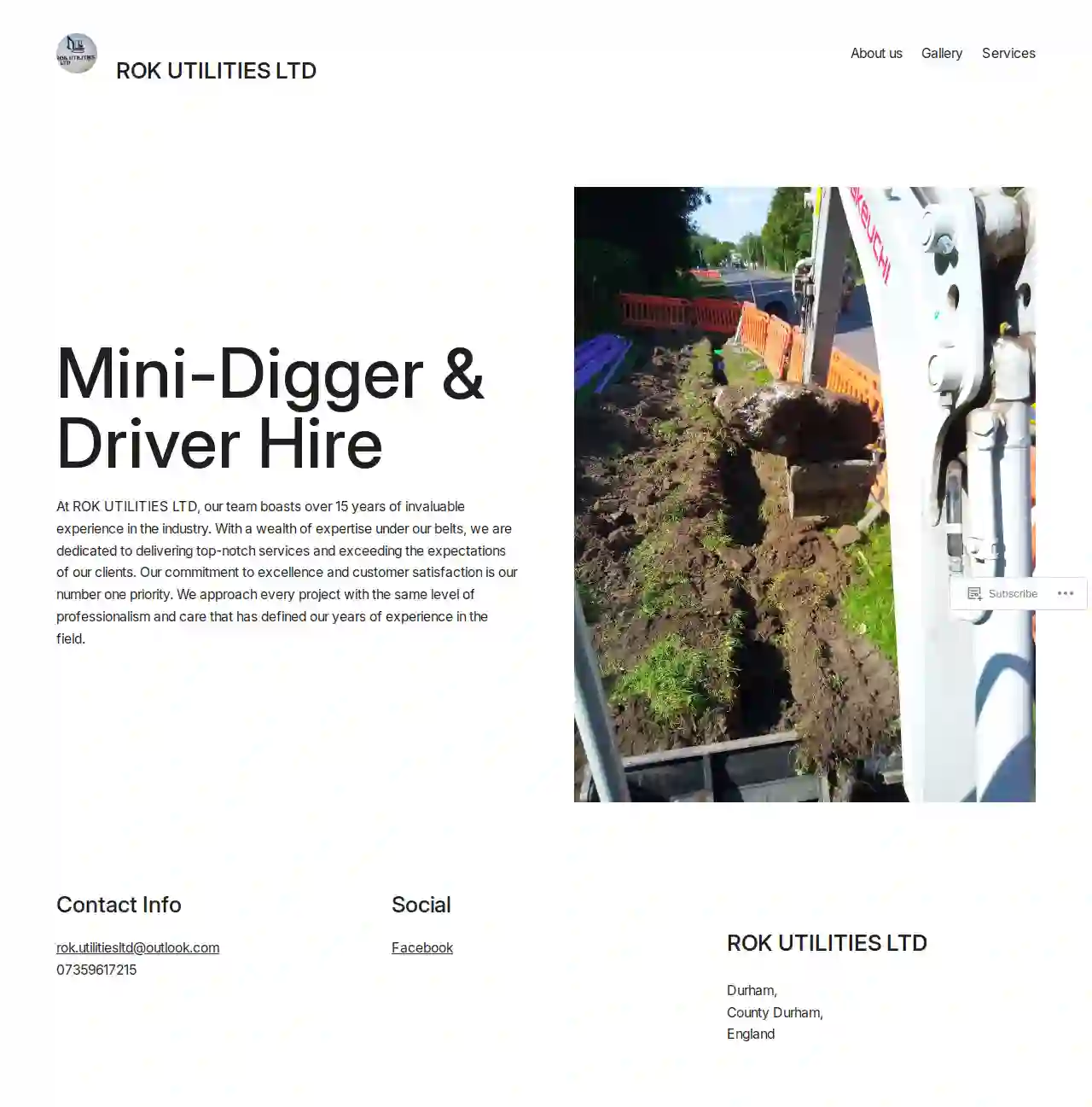Excavation Contractors Consett
Find top Excavating Contractors in Consett
Get multiple Excavation Contractors quotes for your project today! Compare profiles, reviews, accreditations, portfolio, etc... and choose the best offer.

Rok utilities ltd
51 reviewsDurham, County Durham, GBAbout ROK UTILITIES LTD At ROK UTILITIES LTD, our team boasts over 15 years of invaluable experience in the industry. With a wealth of expertise under our belts, we are dedicated to delivering top-notch services and exceeding the expectations of our clients. Our commitment to excellence and customer satisfaction is our number one priority. We approach every project with the same level of professionalism and care that has defined our years of experience in the field.
- Services
- Why Us?
- Gallery
Get Quote
JW Plant Hire & Excavation
54 reviewsDurham, GBJW Plant Hire & Excavation We are a reliable and hardworking family run business, located in County Durham. Providing excavation services and micro plant machinery hire, in and around the North East of England. I'm committed to providing a high standard of service. No matter the size of the job, I guide my clients every step of the way and offer highly competitive rates. Take a look at my services below and call me today to schedule an initial consultation.
- Services
- Why Us?
- Gallery
Get Quote
Herrington Landscapes Ltd
522 reviewsDurham, GBHERRINGTON LANDSCAPES Bespoke garden design & installation With over 14 years of experience Herrington Landscapes can work with you to create a bespoke garden design & installation. Let us take care of your dream garden.
- Services
- Why Us?
- Testimonials
- Gallery
Get Quote
Over 11,537+ Excavation Companies on our directory
Our excavation experts operate in Consett and surroundings!
ExcavationHQ has curated and vetted the Best Excavation Contractors near Consett. Find the most trustworthy contractor today.
Frequently Asked Questions About Excavation Contractors
- Clearly Define the Scope: Outline the project's goals, including the excavation area, depth, grade, and intended use.
- Obtain Necessary Permits: Research and acquire any required permits from your local authorities.
- Mark Utility Lines: Contact your utility companies to locate and mark underground utilities to prevent damage.
- Communicate with Neighbors: Inform your neighbors about the project's timeline and potential noise or disruptions.
- Prepare the Site: Clear any obstacles, such as vegetation, furniture, or structures, from the excavation area.
- Discuss Safety Protocols: Review safety procedures with the contractor to ensure a safe work environment.
- Experience: Choose contractors with a proven track record and years of experience in excavation projects similar to yours.
- Licensing and Insurance: Verify that they are properly licensed to operate in your area and carry adequate insurance to protect you from liability in case of accidents or damage.
- Equipment and Resources: Ensure they have the necessary equipment and resources to handle your project efficiently and safely.
- Positive Reviews and References: Check online reviews and testimonials from previous customers. Request references and contact them to inquire about their experience with the contractor.
- Professionalism: Opt for a company that communicates clearly, provides detailed and transparent estimates, and has a responsive and courteous team.
- Clear the Area: Remove any obstacles, including vehicles, outdoor furniture, landscaping features, or structures, from the excavation zone and surrounding area.
- Mark Existing Features: Identify and mark underground utilities, septic tanks, sprinkler systems, or other buried elements you want to protect.
- Protect Landscaping: Use tarps or fencing to shield trees, shrubs, gardens, or other landscaping elements from damage.
- Provide Access: Ensure the excavation contractor has clear access to the work area, including gates wide enough for equipment.
- Discuss Logistics: Coordinate with the contractor regarding parking arrangements, material delivery, and any special instructions or concerns you might have.
- Hauling to Designated Disposal Sites: Transporting excavated material to approved landfills or recycling centers.
- Recycling or Reuse: If suitable, some excavated soil might be recycled for other projects or reused on-site for landscaping or backfilling.
- Complying with Regulations: Adhering to local and environmental regulations for soil disposal to prevent contamination or illegal dumping.
What should I do before excavation starts?
How do I find a good excavation contractor?
How do I prepare my property for excavation?
How do you handle soil disposal after excavation?
What should I do before excavation starts?
- Clearly Define the Scope: Outline the project's goals, including the excavation area, depth, grade, and intended use.
- Obtain Necessary Permits: Research and acquire any required permits from your local authorities.
- Mark Utility Lines: Contact your utility companies to locate and mark underground utilities to prevent damage.
- Communicate with Neighbors: Inform your neighbors about the project's timeline and potential noise or disruptions.
- Prepare the Site: Clear any obstacles, such as vegetation, furniture, or structures, from the excavation area.
- Discuss Safety Protocols: Review safety procedures with the contractor to ensure a safe work environment.
How do I find a good excavation contractor?
- Experience: Choose contractors with a proven track record and years of experience in excavation projects similar to yours.
- Licensing and Insurance: Verify that they are properly licensed to operate in your area and carry adequate insurance to protect you from liability in case of accidents or damage.
- Equipment and Resources: Ensure they have the necessary equipment and resources to handle your project efficiently and safely.
- Positive Reviews and References: Check online reviews and testimonials from previous customers. Request references and contact them to inquire about their experience with the contractor.
- Professionalism: Opt for a company that communicates clearly, provides detailed and transparent estimates, and has a responsive and courteous team.
How do I prepare my property for excavation?
- Clear the Area: Remove any obstacles, including vehicles, outdoor furniture, landscaping features, or structures, from the excavation zone and surrounding area.
- Mark Existing Features: Identify and mark underground utilities, septic tanks, sprinkler systems, or other buried elements you want to protect.
- Protect Landscaping: Use tarps or fencing to shield trees, shrubs, gardens, or other landscaping elements from damage.
- Provide Access: Ensure the excavation contractor has clear access to the work area, including gates wide enough for equipment.
- Discuss Logistics: Coordinate with the contractor regarding parking arrangements, material delivery, and any special instructions or concerns you might have.
How do you handle soil disposal after excavation?
- Hauling to Designated Disposal Sites: Transporting excavated material to approved landfills or recycling centers.
- Recycling or Reuse: If suitable, some excavated soil might be recycled for other projects or reused on-site for landscaping or backfilling.
- Complying with Regulations: Adhering to local and environmental regulations for soil disposal to prevent contamination or illegal dumping.